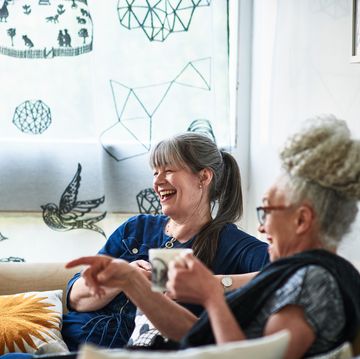Great news if you find slogging it out on the treadmill a massive snore because a new study has shown that a fun exercise alternative might be the best option for over 40s: dancing.
This is because learning a new dance could actually help protect our brains from the effects of ageing, the New York Times reports.
Yep, that's right Strictly fans – it's time to hit the dance floor.
According to a new study by the University of Illinois, published last month in the journal Frontiers in Aging Neuroscience, learning what they call a 'social dance' has a unique anti-ageing effect on our brains, not seen in other exercise alternatives, including walking.
Scientists have long known that, after roughly the age of 40, our brains alter and slow, processing information less quickly as we get older. They believe this is down to a decline in the efficiency of our 'white matter', which helps transmit messages around the brain.
In this new experiment, the team decided to see whether particular types of exercise could have an effect on the function of older brains. Studying nearly 200 people in their 60s and 70s with no signs of cognitive impairment, the team tested both their aerobic fitness and mental capacities, including their brains' processing speed.
The researchers then randomly divided the volunteers into groups, asking them to do one of three activities: walking at a brisk pace three times per week; doing gentle stretching and balance training; and learning to dance.
This last group spent three hours a week learning an increasingly complicated 'country' dance, with people moving from partner to partner in a sequence.
After six months doing their respective new regimes, the volunteers' brains were tested again and, lo and behold, the dancers were a step ahead of the others.
While all of the participants' brains did show signs of declining white matter, most probably because of their advancing ages, one group showed an improvement in the health of some of their white matter: the dancers.
In fact, they had stronger white matter in the area of their brains linked to processing speed and memory.
And, almost every single one of the volunteers performed better in cognitive tests than they had six months previously, even if there were no changes in their white matter, which the team believe indicates that engaging in 'any activities involving moving and socialising' is beneficial for ageing brains.
'The message is that we should try not to be sedentary',' added study author Dr Agnieszka Burzynska. 'The people who came into our study already exercising showed the least decline.'

Francesca is the Digital Editor of Red, overseeing all sections of the site. She loves travel, books and pizza, so a beach holiday in Italy is pretty much her dream scenario.













